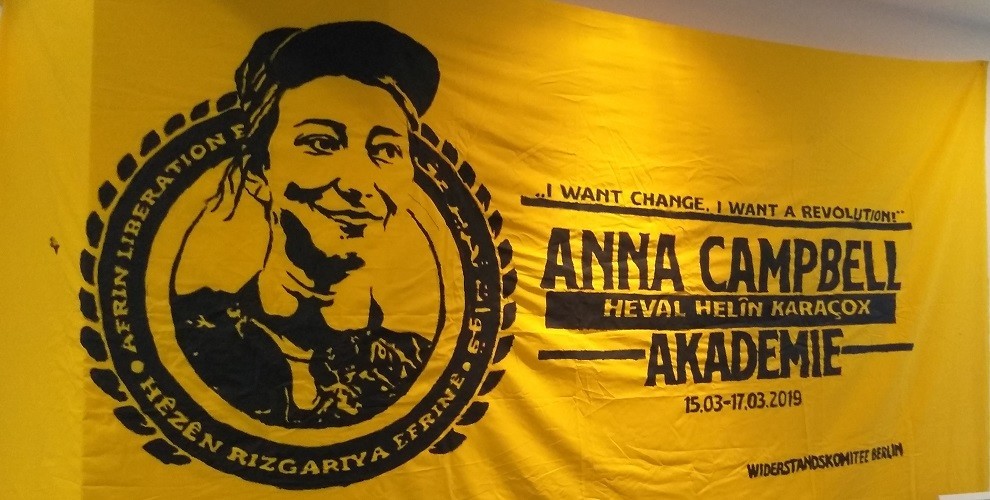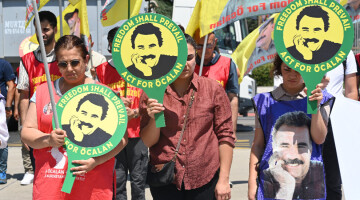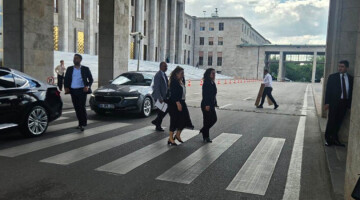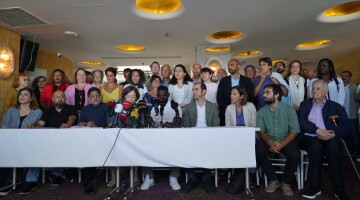A year ago, in the morning, 3500 kilometres away from Germany near the town of Cindirês in the canton of Efrîn, a large convoy moved away from the rapidly approaching front. It is the 55th day of resistance against the Turkish invasion. The majority of the 300 people in the convoy are civilians who are evacuated away from Islamist gangs and Turkish soldiers. Away from terror and death. Towards noon, the dark shadows of Turkish fighter planes are visible on the slopes of the nearby mountains. The engine sounds of the planes are accompanied by the deep thunder of heavy artillery. A short time later almost all of the 300 people in the convoy are dead. Among them was the internationalist Anna Campbell (Hêlîn Qereçox).
In memory of Anna Campbell, the Berlin Resistance Committee organized an academy bearing her name. Over 50 internationalists came together for a weekend to learn and discuss. The first part of the academy began with reading letters from her friends to Anna Campbell and her own texts.
Like the sun
Anna Campbell was born in Lewes, England, and recognised at an early age the injustice of the world in which she grew up. In England, Anna took part in animal liberation campaigns and student protests. As an anarchist, she rebelled against the world of capitalist modernity. She fought against the state prison system and supported imprisoned comrades.
Finally, she decided to go to Syria to participate in the Rojava Revolution as Hêlîn Qereçox in the YPJ. She was deeply impressed by the ideals of women's liberation and equality of all people who lived in the midst of the war. After her death, her friends write about Anna in the internationalist commune: "You were like the sun. You radiated light and warmth, you gave life to all people who crossed your path, that's why all people who knew you loved you, that's why they admired you.
Free from paralyzing powerlessness
The Anna Campbell Academy dealt with the principles and conditions of revolutionary organization. In order to make a successful social policy against the strategies of imperialist aspirations and global capitalism, we must understand how the various political actors act. Only then can we free ourselves from the feeling of powerlessness that paralyzes us. This is why the Academy's prelude was devoted to the analysis of the global political situation. The participants debated the significance ofthe war in the Middle East for our local politics and the strategy pursued by the various states. At the same time, the development of the global resistance was named and evaluated.
Where are Germany and Europe heading?
On the second day, the discussion focused in particular on theinternational role and strategy of German state policy. Where is Germany heading? And where is Europe heading? "It is the time of organisation and coordination," said Anna Campbell. In response to this call, the speaker's lectures dealt with the organisational history of the Kurdish movement and the practice of democratic confederalism. In the following discussion rounds it was considered what form a social organization should take and what consequences this would have for the practice of the resistance committee.
Organized against the attacks of capitalist modernity
The day ended with a joint cultural evening filled with inspiring poems, singing and dancing. At the end of the day, the participants were motivated to talk about further political perspectives and to reflect on the education. The Resistance Committee is on a right track, but we still have a long way to go. The participants were united by the realization that we can only defend ourselves against the attacks of capitalist modernity in an organized way. The academy ended with the feeling that it had responded to Anna Campbell's call.














